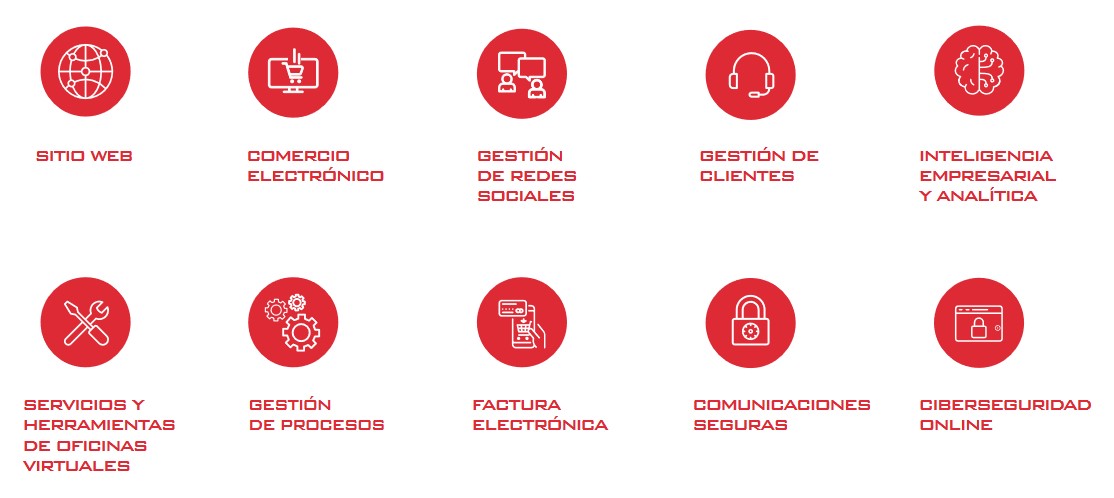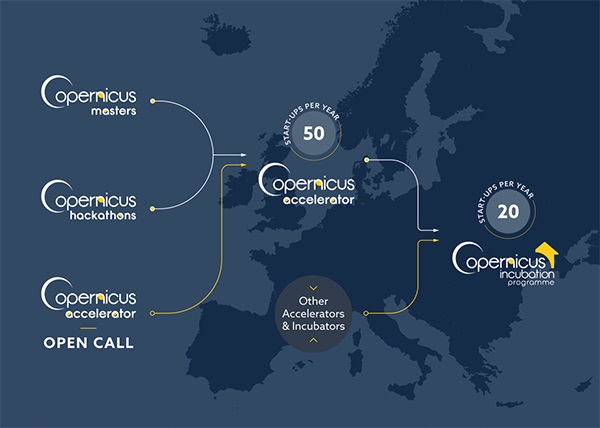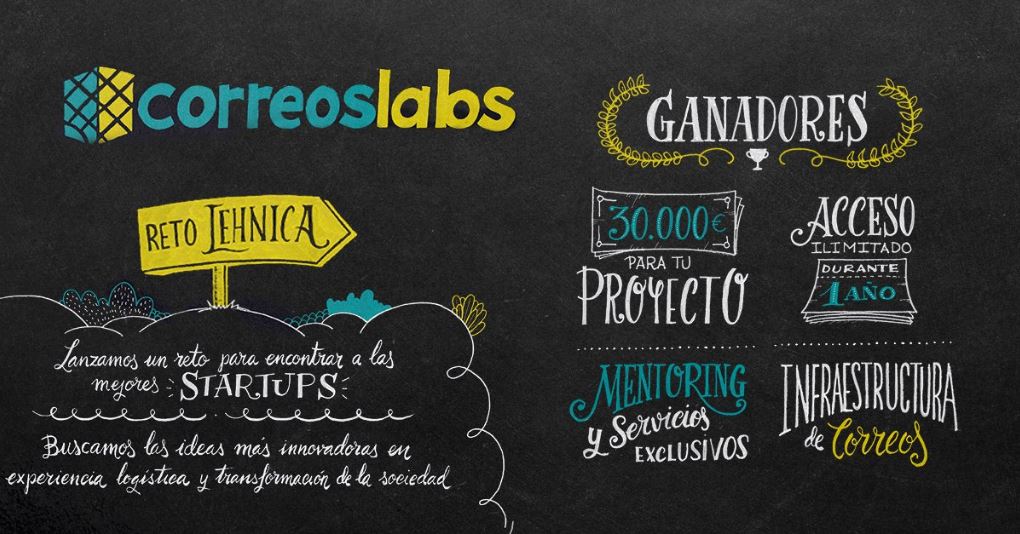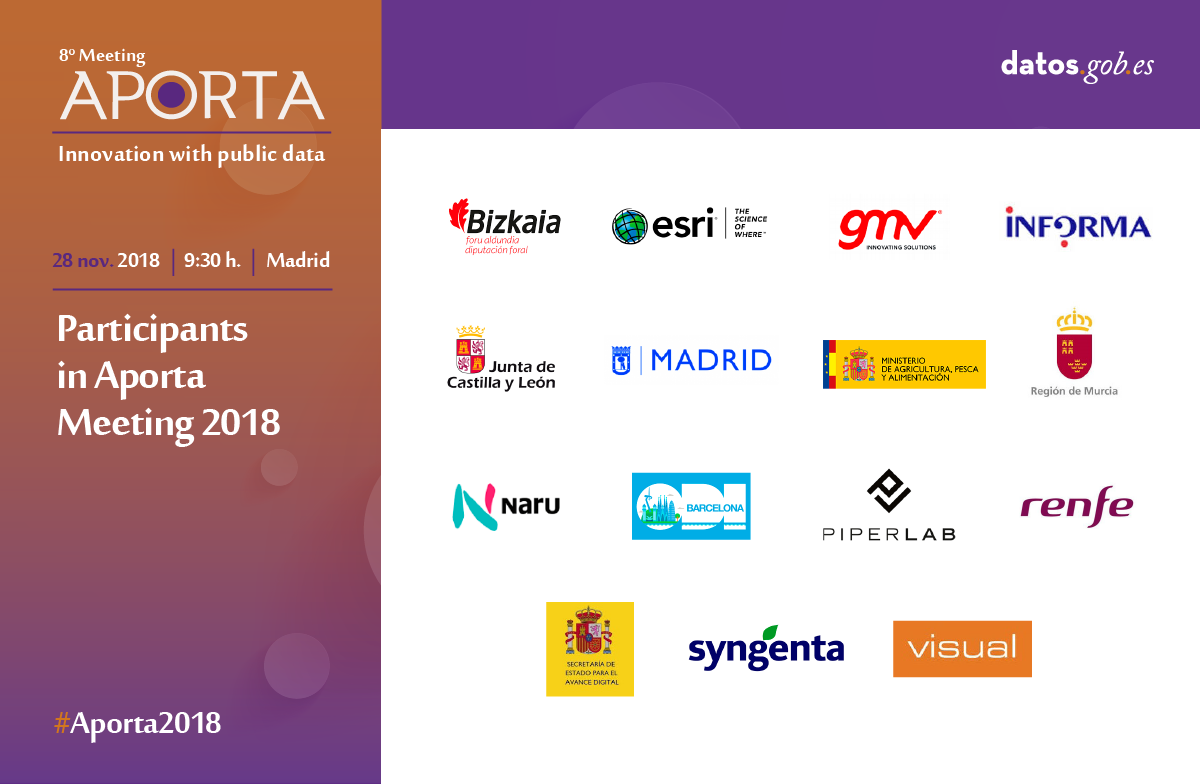Small and medium-sized enterprises (SMEs) play a major role in the Spanish economy. 99% of companies in our country have fewer than 50 workers, and employ 50% of the workforce. Although many of these SMEs have already begun their transformation towards digitalization, it is true that there is still some way to go. According to the latest DESI report, 62% of Spanish SMEs have at least a basic level of digital intensity. However, they are below the European average in the use of cloud services or Big data analysis, all capabilities that can generate great benefits and opportunities for companies.
Among the advantages of digital transformation, we find the boost in productivity, time and cost reduction, improved customer experience... and also greater ease in collecting, combining and analysing data, promoting greater knowledge of what is happening inside and outside the company for better decision making.
To boost the digital transformation of SMEs, the Ministry of Economic Affairs and Digital Transformation has launched Acela pyme, a program that offers advice, training and high-value services to take advantage of all the benefits of the digital world.
What is Acelera Pyme?
Acelera pyme is a program developed by Red.es, under the Secretary of State for Digitalization and Artificial Intelligence, which seeks to build the reference ecosystem for the digital transformation of Spanish SMEs.
This action is part of the SME Digitalization Plan 2021 - 2025, aligned with the Recovery, Transformation and Resilience Plan and the 2025 Digital Spain agenda. With a budget of more than 4,000 million euros, it includes 16 actions structured into 5 lines of action: basic digitalization of SMEs, support and management of change, disruptive innovation, digital entrepreneurship and support for sectoral digitalization.
The Acelera pyme program is aimed at SMEs of any size, sector and level of digitalization. It has three main lines of action:
- Acelera pyme platform. This is a digital meeting point for SMEs and the agents involved in their digitalization. It includes general resources, as well as other specific resources by sector of activity. On this platform you can find various contents (success stories, news, interviews, audio-visual resources, reports, etc.) to expand knowledge, as well as self-assessment tools to know the level of digital maturity of a company and identify areas for improvement. Currently available is the trade sector, which centralizes all the specific information of great value for the digitization of this sector and the development of e-commerce.
- Acelera pyme office network. Following the signing of an agreement with the Spanish Chamber of Commerce and other agents, a network of physical offices has been set up throughout the country. These offices provide on-site and remote assistance for the resolution of queries, including advice and information on access to public and private financing.
- Support and Advisory Services. The program includes technical and specialized support, as well as seminars and practical workshops throughout Spain.
Self-assessment tools
As mentioned above, one of the resources available on the Acelera pyme platform are the self-assessment tools. These are a series of tests and questionnaires to determine the degree of digitization achieved. Specifically, users can currently take three tests:
- Digital diagnostic test, to know the level of digital intensity according to DESI and the situation compared to other SMEs in Spain.
- Digital transformation self-assessment, to find out the specific level of maturity in various areas of digitization.
- Cybersecurity self-assessment, to discover the company's level of maturity in cybersecurity.
By performing these tests, the company obtains a roadmap with steps to be taken, as well as specific information on each area of digitization.
To access this service, prior registration is required.
The Digital Kit Program
Among the actions of Red.es and the Secretary of State for Digitalization and Artificial Intelligence to promote the transformation of SMEs and the self-employed is also the launch of the Digital Kit, a program of financial aid that provides access to a large catalog of digital solutions. It consists of a digital voucher, which users can redeem to choose between different services offered by a series of digitalizing agents. These services are as follows:

Those who want to access the digital bonus, must first register in Acelera pyme and complete the digital diagnostic test. Once this step has been completed, and the digital solutions to be implemented have been chosen, the application must be made through the electronic headquarters of Red.es. The complete information is included in the Regulatory Bases for the granting of aid for digitization.
Digital transformation involves not only an optimization of processes, by incorporating technologies that boost efficiency or informed decision-making, but can also bring new opportunities and business models, many of them related to the world of data. The aim of these actions is to boost the competitive capacity of SMEs, boosting the Spanish economy, entrepreneurship and innovation.
COPERNICUS, the Earth observation program of the European Union, is the world's largest geospatial data provider, with a current production of twelve terabytes a day. The possible uses of this data, many of which are made available to citizens for free, are multiple and can have a place in various economic sectors: from promoting political decision-making to improve sustainability or emergency management to optimize transport or agricultural management. Its economic potential is therefore immense. But starting a business that uses this kind of data is not always easy.
In this context, COPERNICUS START-UP PROGRAMME was born, to help entrepreneurs and new companies to promote new businesses based on the data offered by the Copernicus project. The program consists of four components: prizes, hackathons, acceleration program and incubation program.
- The Copernicus Prizes support the generation of new applications and business ideas. Aimed at entrepreneurs, start-ups and students, they are awarded in the context of the Copernicus Master project. In 2019, participants have had the opportunity to win prizes with a total value of more than 450,000 euros and additional benefits such as coaching, technical support or marketing assistance. To do this, they had to solve a series of challenges posed by partners such as Airbus, the European Space Agency (ESA) or the German Ministry of Transport.
- Copernicus Hackathons are events in which programmers and subject-matter experts collaborate to develop software solutions based on Copernicus data and services that solve global social and economic problems. In this regard, the European Commission funds 20 Copernicus hackatons every year throughout Europe, which can be organized by any organization that is running for it.
- Copernicus Accelerator is a 12-month acceleration program that welcomes 50 new entrepreneurs every year in the European territory. During the program, each participant has the help of a mentor who offers a personalized guide to achieve a commercial objective (for example, participate in an incubator programme or obtaining a first client). The program begins and closes with two BootCamps, where all participants meet their mentor and can expand their contacts network. In addition, participants have at their disposal a virtual training program with new online courses every month.
- Copernicus Incubator is the incubation program for start-ups that are less than 5 years old. Each year, the program grants 50,000 euros to 20 European companies, to finance its consolidation. In 2020, three new rounds of financing will take place in February, May and October.

To these programs we must add other initiatives such as Copernicus Relay and Copernicus Academy. Copernicus Relay is a program made up of organizations that coordinate and promote local activities around the Copernicus program, while Copernicus Academy connects European universities, research institutions, business schools and private organizations from the countries participating in the program, facilitating collaboration between them. You can read more about both programs and the role of Spain in them in this article.
In short, thanks to all these activities, the development of innovative applications and products increase to make the lives of European citizens and other places in the world easier. In the use cases section of the Copernicus website you can see some of the projects carried out based on the information provided by the program, which can inspire you to dare to innovate with the geospatial data provided by Copernicus.
For the third consecutive year, Correos has launched the Lehnica challenge, an entrepreneurial contest that seeks to boost innovation as an essential value of business progress. Through this challenge, a maximum of 5 projects will be selected to become part of Correoslabs, the entrepreneurship and innovation space of Correos.
Who is it for?
The Lehnica Challenge is aimed at newly created companies with a maximum age of three years and having their registered office in Spain.
What does it consist of?
Interested companies have to sign up on the Correoslabs website. Once registered, they can download a template that must be filled in with all the requested information and submitted following the rules indicated in the contest rules.
The projects presented must be focused on the development of innovative products or services in one of the following categories:
- Emerging technologies: projects aimed at transforming traditional businesses or creating new services using artificial intelligence, Blockchain, Big Data or Internet of things, among other technologies.
- Logistics: projects that improve the logistics experience, in areas such as traceability, new delivery models, circular economy or energy efficiency.
- Social: projects that contribute to the promotion and revitalization of rural environments.
- Public services: projects focused on improving the provision of public services.
After an evaluation process, a maximum of 5 projects will be selected.
What benefits do the selected companies obtain?
The selected companies will receive up to 30,000 euros to develop their project. The program will be developed over a year, based on a personalized calendar proposed by Correos where the achievements will be included.
In addition, these companies will have at their disposal:
- Correoslabs facilities, a fully equipped coworking space where you can share opinions with other entrepreneurs.
- A personalized mentoring program, which includes individual tutoring with internal post experts who will accompany and work as a guide for the selected companies.
- A coaching program with professional experts in business development.
- The possibility of integrating into the entrepreneurial and accelerating community of the different collaborating partners of Correoslabs ecosystem.
How long the call is open?
Applications can be submitted until Friday, December 13 at 2:00 p.m.
The program will begin in February 2020.

8th Edition of Aporta Meeting will take place on November 28. In this occasion, the event will focus on the power of public data to promote innovation and entrepreneurship. Under the motto "Innovation with public data", consolidated companies, start-ups and public bodies will share their experience about taking advantage of improvement and business opportunities linked to open data and new technological paradigms, such as Big Data or Artificial intelligence.
Thanks to these testimonies, attendees can learn first-hand about the challenges of an innovative project with open data, and discover possible solutions. The objective is to create an inclusive and dynamic event, where attendees can also share their concerns and own experiences through collaborative round tables.
The Meeting will begin at 9:30 in the Assembly Hall of the Secretariat of State for Digital Progress (Ministry of Economy and Enterprise).
- Round table 1: The value of open data reuse for Public Administrations
The first round table will be focused on public administrations and how the reuse of their data allows optimizing the services offered to citizens.
There are many examples of local, regional or state entities that have implemented services and applications based on public data to improve their agility and efficiency. These services allow a more direct communication, promoting transparency and accountability, as well as a greater participation of citizens in their locality or region political life. In addition, through the data analysis, these organizations can also identify behavior patterns that drive better resource planning and greater services personalization.
In order to address this issue, representatives from the following entities will participate in the round table: City of Madrid - who will moderate the debate-, Ministry of Agriculture, Fisheries and Food, Junta of Castilla y León, Autonomous Community of Murcia, Renfe and Provincial Council of Bizkaia.
- Round table II: Public sector information and entrepreneurship
According to the latest data from the National Observatory of Telecommunications and the Information Society (ONTSI), currently, there are more than 530 small and medium-sized companies with the objective of creating ideas and new products based on public information and data. These companies generated a turnover of 1,500 - 1,750 million euros and more than 5,000 direct jobs in 2016.
Innovation based on public data is especially noticeable when we talk about entrepreneurs and start-ups. The availability of free public data or public data with a marginal cost reduce the risk of starting a new business.
Therefore, the second round table will be integrated by entrepreneurs and startups from different sectors that are developing new products and services based on public data reuse and analysis. This is the case of VisualNACert, a software developer that improves the management of agricultural farms, Piperlab, which uses Big Data technologies and data sciences to develop algorithms that improve decision making, or Naru Intelligence, which applies data analytics to biomedicine sector. This round table will be moderated by Barcelona Open Data Initiative.
- Round table III: Public data and business development
But open data is not only useful for entrepreneurs. An increasing number of private entities use public data to face business challenges and improve their competitiveness. For these companies, public data has become an additional business resource that contributes to maintaining leadership in their industry sector, reducing corporate costs, adapting to and evolving with agility in their environments and collaborating with clients - and even competitors- to face industry challenges.
Therefore, the third round table will be integrated by four international companies that will explain how public data use help improve their products or services, adapt to new markets and expand their radius of influence in the industry. These companies are Informa, Syngenta, GMV and Esri, who will share their experience under the moderation of the Secretariat of State for Digital Progress.
The complete agenda is available in this link. Although the event is free, places are limited. Therefore, those interested in attending must register in this link.
